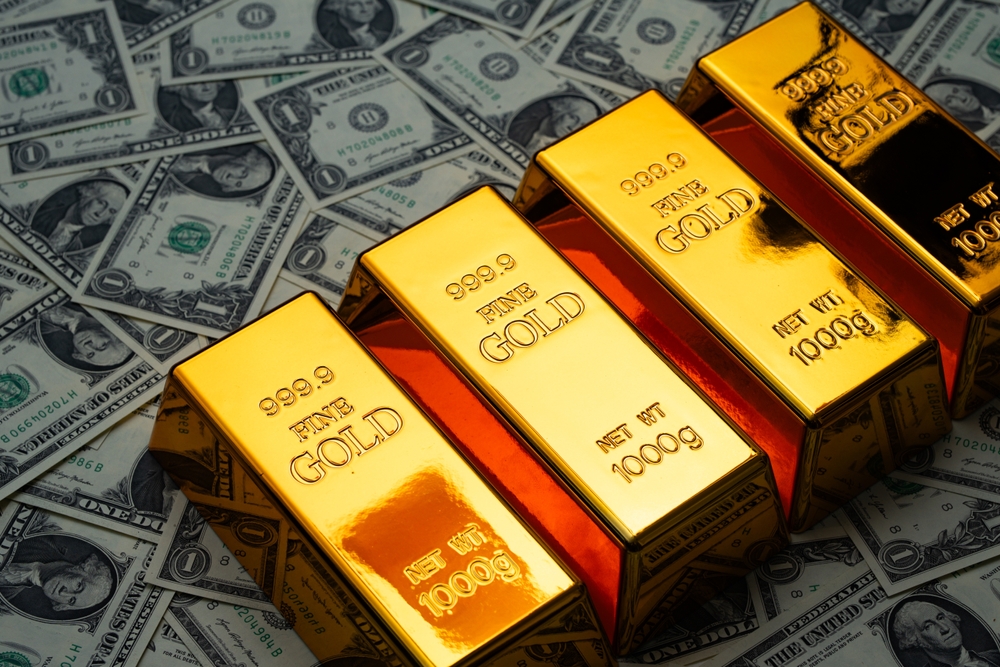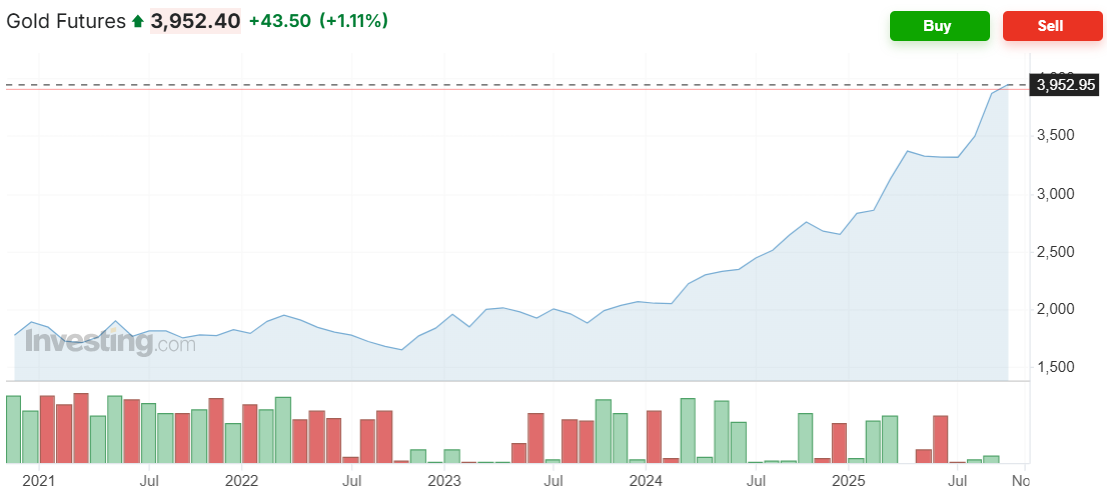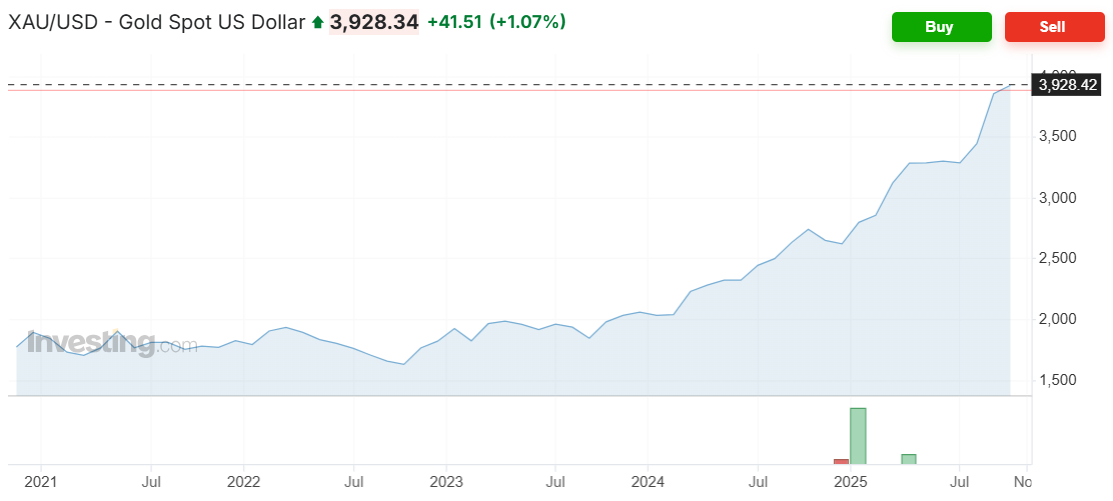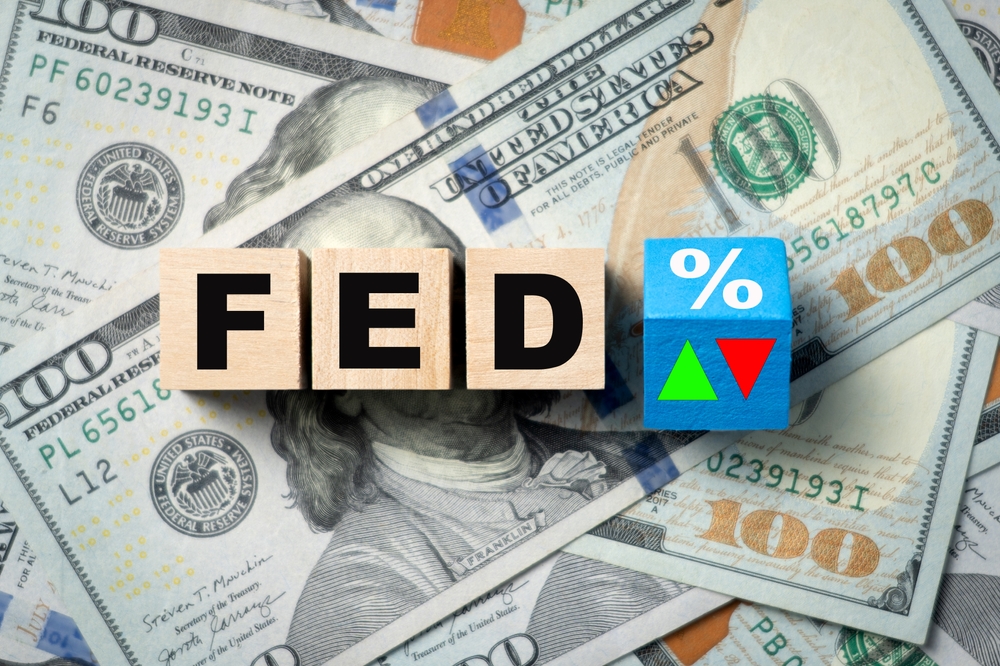
Gold's growth has temporarily halted. It is now only tens of dollars away from the 4,000 mark
Gold is approaching the breakthrough of another psychological barrier, which was preceded by a slight decline. For the precious metal, it was only a short pause before reaching a new record level just a few days later. A source of mild tension is the budget crisis in the United States, which is pushing investors toward safe havens. The driving forces remain the lowering of interest rates, increased interest in funds, and the replenishment of gold reserves.
At a new high
On Friday, October 3, 2025, the price of futures contracts halted at 3,908 USD per ounce, falling from previous highs, but only briefly before rising again to a new record of 3,952 USD by October 6, 2025. Despite this, gold has recorded long-term growth of several dozen percent. Compared with the same period a year ago, it rose by 48%, and over a five-year performance period, it gained more than 107%.*

Source: Investing.com*
A similar development occurred with spot gold, which started the week at a record 3,928 USD after its price fell to 3,886 USD per ounce on October 3, 2025. Over the past year, spot gold recorded an appreciation of 48%, and over the past five years, it rose by 109%.*

Source: Investing.com*
Government shutdown returns after years
Gold, as a safe haven, is largely supported by the political situation in the United States, which has been hectic since Donald Trump took office. Since October 1, 2025, the country has faced the suspension of several government institutions and services. The reason lies in the differing views of Republicans and Democrats on the budget bill for the following year, which was supposed to take effect at the beginning of the month. The opposition mainly disagrees with cuts in healthcare. The situation affects less essential services, such as culture, food assistance, national parks, and tourism, with up to 750,000 employees reportedly being sent on unpaid leave, according to BBC. Such an event has occurred several times over the past decades. Most recently in 2018, when, according to BBC, it lasted for the longest period in history — 35 days. Whether the same scenario will repeat itself remains uncertain, but each day could leave a mark on the U.S. economy. As BBC further reports, every week that institutions remain closed would mean a slowdown in economic growth by 0.1 to 0.2 percentage points. Layoffs, which Trump has also discussed, would worsen the situation even further. However, history has shown that the overall impacts are not as severe as feared, which is why market reactions are less aggressive and gold’s rally has temporarily eased.
Further rate cuts ahead?
A positive factor for the growth of the yellow metal is also the lowering of interest rates, which the Federal Reserve (FED) implemented for the first time this year in September. Another cut is expected at the October meeting, with the CME FedWatch tool showing a probability of more than 96% (data as of October 5, 2025). This move is also supported by labor market data, which are crucial for the FED. For example, data from the private sector showed that 32,000 jobs were cu in September — a sharp increase compared to 3,000 in August and against estimates that expected an addition of 50,000 jobs.
The yellow metal in demand
Gold also benefited from increased interest in gold-backed funds. According to data from Bloomberg, inflows into these funds reached a three-year high in September, while after a period of slowdown, Chinese buyers also began investing more actively. Central banks are showing interest as well — after stagnation in July, they added 15 tons to their reserves in August. According to a report from the World Gold Council released in early October, the National Bank of Kazakhstan was the largest buyer (8 tons), while the Bulgarian National Bank (2 tons) recorded its biggest monthly increase since 1997. The National Bank of Poland, for example, plans to further expand its purchases, which have already reached 67 tons this year. The opposite scenario occurred with banks in Russia and Indonesia, which together sold 5 tons of gold. Banks are diversifying on a large scale and do not seem to be planning to abandon their strategies, though historically high gold prices are slowing down their buying activity.
Outlook for further growth
Potential growth in gold prices is still anticipated by banks such as Goldman Sachs and Switzerland’s UBS. The latter estimates that the price per ounce could reach 4,200 USD, representing an increase from this year’s 3,800 USD. Goldman Sachs, on the other hand, forecasts a value of 4,000 USD, which could rise even higher if private investors are taken into account or if Donald Trump continues to pressure the FED.[1]
*Past performance is not indicative of future results
[1] Forward-looking statements are based on assumptions and current expectations, which may be inaccurate or may change due to shifts in the economic environment. Such statements are not guarantees of future performance. They involve risks and other uncertainties that are difficult to predict. Actual results may differ materially from those expressed or implied in any forward-looking statements.




